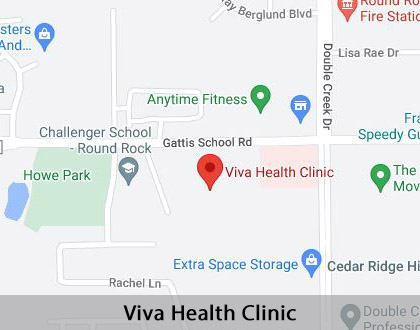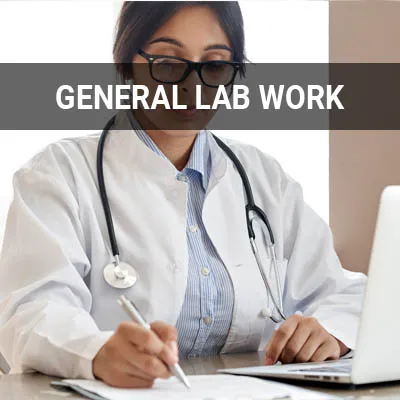General Lab Work Round Rock, TX
Laboratory testing can help a person in early detection, diagnosis, and even treatment of a disease. Getting a lab test allows your primary care practitioner to respond with preventative treatment if necessary. It can also help a person save time, money, and save one's life from possible diseases. Many, if not all, medical professionals use the results of common lab tests in making healthcare decisions for patients.
Common lab tests are available at Viva Health Clinic in Round Rock and the surrounding areas. Contrary to what one may think, getting lab tests is common and not as inconvenient as one may think. Call us today at (512) 243-5872 to learn more about general lab work or schedule an appointment.
Understanding Lab Tests
Many people wonder how laboratories conduct general lab works and question their reliability. In the United States, laboratory testing follows state and federal standards. In an article titled How Reliable is Laboratory Testing?, Lab Tests Online states that laboratory test methods in the country need to meet scientifically rigorous criteria. Common lab tests, which examine specimens from a patient to measure the levels of chemical components in body fluids and tissues, have also undergone the same criteria.
Having the proper general lab works will help your practitioner or healthcare provider. According to a 2009 article in the Laboratory Medicine magazine of the Oxford University Press, there are four main reasons why a medical practitioner orders laboratory tests. These include the ruling in or out of a diagnosis, monitoring of treatment, screening for possible diseases, and understanding the disease.
“According to a 2009 article in the Laboratory Medicine magazine of the Oxford University Press, there are four main reasons why a medical practitioner orders laboratory tests.”
Common Lab Tests
Thousands of lab tests are available. Each one results in different health implications. However, most patients do not need to undergo all of them. The following are some of the common lab tests that practitioners commonly order:
- Basic Metabolic Panel (BMP) requires a small sample of the patient’s blood to measure how well the kidneys work; the fluid balance through electrolytes; the levels of blood sugar, bone calcium, side effects of medications; and risks of having diseases.
- Complete Blood Count (CBC) is blood work that is part of routine medical examinations. It measures white blood cells, red blood cells, and platelets. It can help check for anemia, blood loss, infections, blood diseases, patient’s response to medication or treatment, and the health of chemotherapy patients.
- Comprehensive Metabolic Panel (CMP) includes those that one measures in a BMP. However, it also checks on the liver, other minerals, and blood proteins.
- Lipid Panel tests aim to know if the patient is at risk of developing heart disease. It includes triglycerides, cholesterol, HDL or good cholesterol, LDL or bad cholesterol, HDL ratio, and risk score.
- Prothrombin Time (PT) and Partial Thromboplastin Time (PTT) require blood samples. They determine whether the patient’s blood can form a healthy clot. They can also help check for bleeding disorders and other diseases, such as liver conditions.
- Thyroid Function Tests will check the health of the patient’s thyroid gland, which helps regulate metabolism. The tests also help monitor the health of a patient who takes hormone replacement medications.
- Urinalysis requires a small sample of the patient’s urine. It helps determine if the patient has metabolic or kidney conditions.
Patients may also want to consider other lab tests to ensure their well-being. These may include antibody tests to check on the presence or absence of a particular antibody as well as the amount, an immunoglobulin test to measure the level of certain antibodies that help the immune system, and sexually transmitted infection (STI) tests to determine if they have any signs or symptoms of any STIs. All of these tests only need a small sample of blood from the patient. However, patients should keep in mind that the practitioner may refer them out to another practitioner who'll authorize particular lab tests.
“Patients may also want to consider other lab tests to ensure their well-being.”
Factors to Consider
According to an article on laboratory tests in the National Library of Medicine, some factors affect the results of laboratory tests. These include the person's sex, age, race, what one eats and drinks, medicine intake, and if the person properly followed the pre-test instructions. We will consider all these factors and more. Patients can rest assured knowing that they are getting the most accurate results.
Common lab tests require the patient to follow some steps. However, there is no reason to worry. It does not include a complicated process. Patients should not hesitate to talk to their practitioner if there are things they are unsure of.
“Patients should not hesitate to talk to their practitioner if there are things they are unsure of.”
Check out what others are saying about our primary care practitioner services on Yelp: General Lab Work in Round Rock, TX
The Lab Test Process for Patients
The lab testing process is different for everybody, depending on the test being performed and what the patient's unique needs are. In general, however, patients can expect to follow a certain set of protocols. Occasionally, we may order laboratory tests before upcoming appointments. This allows us to discuss results with patients at their visit and coordinate follow-up care as necessary.
When we re-appoint patients, we will prospectively identify any needed lab tests for the next visit. Patients who miss their lab appointments will typically receive a phone call to urge them to come in for the test they missed and, when applicable, remind them of their upcoming appointment.
We will always follow up with patients with their test results. However, if patients do not hear back, it is imperative to get in contact with us immediately. Patients who take an active role in their own healthcare typically have better health outcomes than those who do not.
“The lab testing process is different for everybody, depending on the test being performed and what the patient’s unique needs are.”
Questions Answered on This Page
Q. When are laboratory tests necessary?
Q. What are some of the most common lab works?
Q. What factors might affect the results of a laboratory test?
Q. What is the lab testing process like?
People Also Ask
Frequently Asked Questions
Q. Who can order common lab tests?
A. Some people think anyone can get common lab tests whenever one wants. However, this is not the case. Only a practitioner or an authorized healthcare provider can order the conduct of lab tests.
Q. Can I take medications before getting general lab work done?
A. The best way to verify this is to ask your practitioner. Tell them what medications you are taking so they can give you proper advice. You should also inform them if you are taking any vitamin or mineral supplements to be sure.
Q. Do I need to fast before undergoing common lab tests?
A. Fasting is not always necessary. Tests that require fasting include glucose, lipid panel, those that contain cholesterol, triglycerides, and HDL, and other comprehensive metabolic panels. Fasting often means no eating or drinking for about eight to 12 hours before the test.
Q. What is the standard frequency of blood work?
A. One of the common lab tests is blood work. Generally, you'll have to get routine blood work once a year. However, you may need to get it more often if you're experiencing persistent symptoms, want to know blood component levels for dietary or fitness purposes, or want to reduce the risks of getting diseases.
Q. Does insurance cover the cost of general lab work?
A. Every insurance policy is different. The best way to know what is covered under your plan is to speak directly to a representative. We can help.
Start Feeling Better – Visit Us Today
By visiting us as soon as possible, our team can help get you the professional treatment you need. Instead of waiting around and allowing the symptoms to get worse, we can provide you with treatment options.
Definition of Medical Terminology
Call Us Today
Understanding common lab tests and how they work can help prepare you for getting one. It also helps you know what type of results to expect. If you want to learn more about general lab work or schedule an appointment, call us at 512-243-5872.
Helpful Related Links
- American Clinical Laboratory Association. American Clinical Laboratory Association. 2023
- American Journal of Medicine. American Journal of Medicine. 2023
- American Medical Association (AMA). American Medical Association (AMA). 2023
- The American Society for Clinical Laboratory Science. The American Society for Clinical Laboratory Science. 2023
About our business and website security
- Viva Health Clinic was established in 2023.
- We accept the following payment methods: American Express, Cash, Discover, MasterCard, and Visa
- We serve patients from the following counties: Williamson, Travis, McLennan
- We serve patients from the following cities: Pflugerville, Austin, Kyle, Waco, Leander, Cedar Park, Bastrop, Round Rock, Georgetown, Hutto, Liberty Hill, and Taylor
- National Provider Identifier Database (1104428416). View NPI Registry Information
- Norton Safe Web. View Details
- Trend Micro Site Safety Center. View Details
Back to top of General Lab Work










